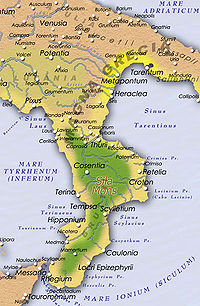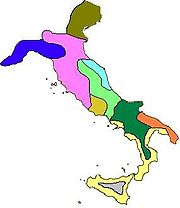
Italiotes
Encyclopedia


Ancient Rome
Ancient Rome was a thriving civilization that grew on the Italian Peninsula as early as the 8th century BC. Located along the Mediterranean Sea and centered on the city of Rome, it expanded to one of the largest empires in the ancient world....
Greek
Greek language
Greek is an independent branch of the Indo-European family of languages. Native to the southern Balkans, it has the longest documented history of any Indo-European language, spanning 34 centuries of written records. Its writing system has been the Greek alphabet for the majority of its history;...
-speaking inhabitants of the Italian Peninsula
Italian Peninsula
The Italian Peninsula or Apennine Peninsula is one of the three large peninsulas of Southern Europe , spanning from the Po Valley in the north to the central Mediterranean Sea in the south. The peninsula's shape gives it the nickname Lo Stivale...
, between Naples
Naples
Naples is a city in Southern Italy, situated on the country's west coast by the Gulf of Naples. Lying between two notable volcanic regions, Mount Vesuvius and the Phlegraean Fields, it is the capital of the region of Campania and of the province of Naples...
and Sicily
Sicily
Sicily is a region of Italy, and is the largest island in the Mediterranean Sea. Along with the surrounding minor islands, it constitutes an autonomous region of Italy, the Regione Autonoma Siciliana Sicily has a rich and unique culture, especially with regard to the arts, music, literature,...
.
Greek colonization of the coastal areas of southern Italy and Sicily started in the 8th century BC
8th century BC
The 8th century BC started the first day of 800 BC and ended the last day of 701 BC.-Overview:The 8th century BC was a period of great changes in civilizations. In Egypt, the 23rd and 24th dynasties led to rule from Nubia in the 25th Dynasty...
and, by the time of Roman ascendance, the area was so extensively hellenized that Romans called it Magna Graecia
Magna Graecia
Magna Græcia is the name of the coastal areas of Southern Italy on the Tarentine Gulf that were extensively colonized by Greek settlers; particularly the Achaean colonies of Tarentum, Crotone, and Sybaris, but also, more loosely, the cities of Cumae and Neapolis to the north...
, "Greater Greece".
The Latin alphabet
Latin alphabet
The Latin alphabet, also called the Roman alphabet, is the most recognized alphabet used in the world today. It evolved from a western variety of the Greek alphabet called the Cumaean alphabet, which was adopted and modified by the Etruscans who ruled early Rome...
is a derivative of the Western Greek alphabet used by these settlers, and was picked up and adopted first by the Etruscans
Etruscan civilization
Etruscan civilization is the modern English name given to a civilization of ancient Italy in the area corresponding roughly to Tuscany. The ancient Romans called its creators the Tusci or Etrusci...
and then by the Romans
Ancient Rome
Ancient Rome was a thriving civilization that grew on the Italian Peninsula as early as the 8th century BC. Located along the Mediterranean Sea and centered on the city of Rome, it expanded to one of the largest empires in the ancient world....
.
Italiote League
TarentumTaranto
Taranto is a coastal city in Apulia, Southern Italy. It is the capital of the Province of Taranto and is an important commercial port as well as the main Italian naval base....
controlled the Italiote League from about the end of the 5th century BC and levied troops from the Greek cities. Dionysius I of Syracuse
Dionysius I of Syracuse
Dionysius I or Dionysius the Elder was a Greek tyrant of Syracuse, in what is now Sicily, southern Italy. He conquered several cities in Sicily and southern Italy, opposed Carthage's influence in Sicily and made Syracuse the most powerful of the Western Greek colonies...
conquered southern Italy (Magna Graecia), crushing the Italiote (Greek) League at the Battle of the Elleporus
Battle of the Elleporus
The Battle of the Elleporus was fought in 389 BC between the forces of Dionysius I of Syracuse and the armies of the Italiote League. The armies of Syracuse triumphed, and Dionysius' control was extended into Southern Italy.-References:...
and destroying Rhegium
Reggio Calabria
Reggio di Calabria , commonly known as Reggio Calabria or Reggio, is the biggest city and the most populated comune of Calabria, southern Italy, and is the capital of the Province of Reggio Calabria and seat of the Council of Calabrian government.Reggio is located on the "toe" of the Italian...
.
See also
- Magna GraeciaMagna GraeciaMagna Græcia is the name of the coastal areas of Southern Italy on the Tarentine Gulf that were extensively colonized by Greek settlers; particularly the Achaean colonies of Tarentum, Crotone, and Sybaris, but also, more loosely, the cities of Cumae and Neapolis to the north...
- Ancient peoples of Italy
- Phlyax playPhlyax playA Phlyax play , also known as a hilarotragedy, was a burlesque dramatic form that developed in the Greek colonies of Magna Graecia in the 4th century BCE. Its name derives from the Phlyakes or “Gossip Players” in Doric Greek...
- Milo of CrotonMilo of CrotonMilo of Croton was a 6th century BC wrestler from the Magna Graecian city of Croton in southern Italy who enjoyed a brilliant wrestling career and won many victories in the most important athletic festivals of ancient Greece...
- Battle of PandosiaBattle of PandosiaThe Battle of Pandosia was fought in 331 BC between a Greek force composed mostly of Macedonians, Epirotes and Tarantines against Southern Italic mountain tribes, including mostly Oscan speaking Samnites, Lucanians, and Bruttii. The Macedonians were led by Alexander of Epirus, the uncle of...

